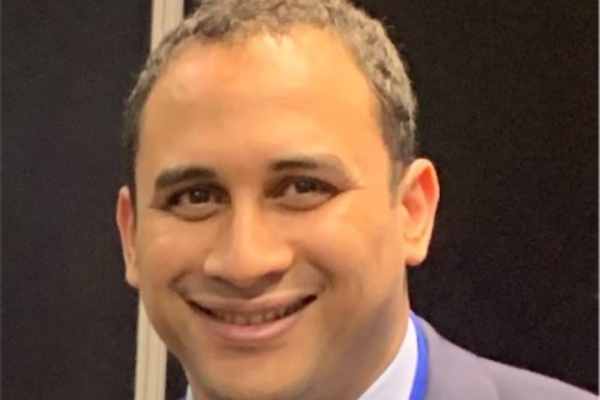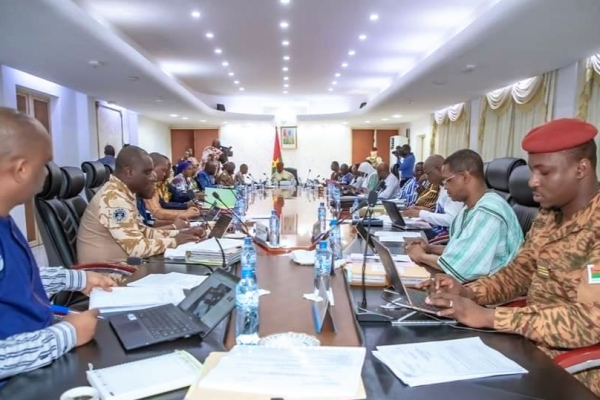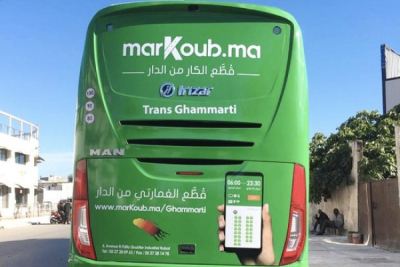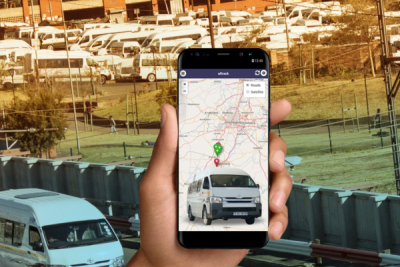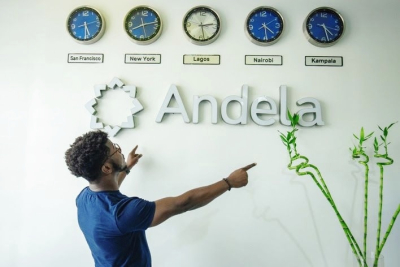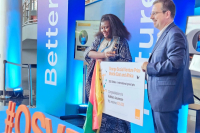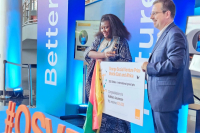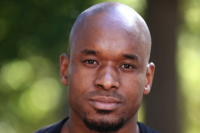Recruiting digital and IT talents can be a significant challenge for companies. To alleviate this burden, Mustapha Moutout is pioneering a tailored recruitment approach in Morocco.
Mustapha Moutout (photo) is the founder and managing director of Novancy One, a recruitment agency specializing in digital and IT professions. After completing his classes préparatoires aux grandes écoles (CPEG) in 2003, he enrolled at the High National School for Computer Science and Systems Analysis (ENSIAS), where he obtained a Master's degree in IT in 2006.
The Moroccan-born entrepreneur founded Novancy One in 2012. His recruitment company specializes in sourcing, assessment, coaching, and training services. Based in Morocco, it has regional offices in France, Côte d'Ivoire, the USA, the UK, Bulgaria and Tunisia. It positions itself as a strategic partner for companies seeking to strengthen their teams with qualified, motivated talent. It also organizes tailor-made events such as Africa IT Days, a virtual recruitment and experience-sharing forum, to strengthen team bonds and attract top talent. Today, the company has over 100 satisfied customers and places over 300 candidates each year.
Mustapha Moutout's professional career began in 2006, as a consulting analyst for Inetum, a digital services and solutions company, and an international group that helps companies and institutions capitalize on digital opportunities. He then joined Société Générale, where he spent two years as a project manager in analysis and organization.
In 2008, he spent three months working for Ribatis, a Casablanca-based digital operator, as a senior consultant before joining Deloitte Consulting in August of the same year. There, he worked as a consultant in the financial services sector. In 2011, he became Strategic Project Manager at Arsen Consulting, a consulting firm where he worked until the creation of Novancy One.
Melchior Koba
In recent years, mobile fraud and cybercrime have risen significantly in Africa's digital space. Governments are, therefore, stepping up measures to put an end to these crimes.
Burkina Faso will reduce the number of SIM Cards each subscriber can register with a single telecom operator from five to two. The measure was adopted by the Council of Ministers in Ouagadougou on Wednesday, October 18.
According to Aminata Zerbo-Sabané, Minister of Digital Transition, Posts and Electronic Communications, the government's measure is aimed at combating insecurity in the country.
"Considering the security situation in Burkina Faso and the improper use of electronic communication services, the government, during today's Council meeting, has decided to enforce a decree aimed at strengthening the regulatory framework governing the identification of electronic communication service subscribers, clients, and providers. It's important to note that there was already the December 2018 decree overseeing that identification process. However, after several years of implementation, challenges and deficiencies have been observed,” she said.
The bill adopted by the Council of Ministers addresses these shortcomings and provides for several other measures, including streamlining the identification requirements for subscribing to electronic communication services, as well as the obligation for operators to sell SIM cards in their agencies or approved sales outlets. Operators and their customers have three months to comply with these new measures.
The new measures are expected to facilitate improved monitoring of SIM card access and enhance the credibility of electronic communication service user data. These actions are aimed at effectively countering any illicit exploitation of these services.
Samira Njoya
Over the past few years, the world has undergone major technological changes. Africa is among the latest to embrace this revolution. It is also one of the most dynamic currently, thanks notably to contributions from actors like Malawi’s Mzuzu E-Hub.
Mzuzu E-Hub is an entrepreneurship, technology, and innovation hub that provides business development support services to firms and emerging entrepreneurs in Malawi. Founded in 2017 by business development professional Wangiwe Kambuzi, it aims to help entrepreneurs acquire the knowledge and skills they need to create and grow their businesses.
The center offers business incubation programs that provide personalized coaching, access to funding, training, and mentoring to selected entrepreneurs, as well as technology integration programs that facilitate access and use of digital technologies for entrepreneurs.
Mzuzu E-Hub also offers a flagship incubation program called Bizcubation. It is a six-month program that helps its portfolio companies establish a sound business model and market strategy enabling them to commercialize their idea and measure social impact. It gives entrepreneurs access to investors and helps them build up an important network of contacts. The program has already graduated 345 emerging entrepreneurs across eight cohorts, with 46.5% female participation since its inception.
Through its Media and Information Literacy Education (MILE) program, the center offers Malawians access to digital skills training, including computer programming, digital marketing, photography and videography, graphic design, and IT. The program has enabled 1,400 community members to learn about existing digital technologies and internet safety.
Mzuzu E-Hub also organizes networking events that connect entrepreneurs with peers, experts, investors, and potential partners. It also provides coworking and meeting spaces that offer a conducive environment for collaborative work and innovation.
The innovation hub has an undeniable impact in Malawi. With the support of partners like the World Bank, Digital Malawi, Make-IT in Africa, Lenovo Digital Opportunity Trust, and AfriLabs, among others, it has trained 572 young people in digital professions and supported 345 entrepreneurs. In 2019, it was awarded the SII Malawi Community Builder Award. Two years later, in 2021, it won the Afrilabs Capacity Building Award-Business Development award.
Melchior Koba
To facilitate efficient bus journey planning within the Kingdom of Morocco, tech entrepreneurs have developed a customized digital solution.
MarKoub is a digital solution developed by a Moroccan startup. It enables users to search for bus prices and timetables, compare offers from several transport companies, and book tickets online. The Rabat-based startup was founded in 2017 by Omar Chaabi and Zouhir Droussi.
The solution features a mobile app accessible for iOS, Huawei, and Android devices. After creating an account with their e-mail address, users can search for available offers by entering the date of travel, departure city, arrival city, and number of travelers. They can then choose the companies and seat(s) that suit them best, and validate their purchase by paying using the payment methods available on the application.
After this step, the user receives a confirmation e-mail containing a code to be shown to board the bus. It should be noted that a reservation fee of 5 Moroccan dirhams (approx. $0.49) applies to certain routes. Also, depending on the size and weight of the luggage, some companies may charge additional fees.
The startup is partnered with over sixty transport companies. Since its launch, it has received several awards, including the Royal Air Maroc Hackathon in 2017, Maroc Telecom's Entrepreneurship Award in 2018, App of the Year at the Moroccan Web Awards in 2019, and the Bronze Award at the Huawei Developer Competition (2020). In 2023, it was among the 100 Moroccan startups that took part in the year’s edition of GITEX Africa in Morocco. Since its launch, the Android version of its app has been downloaded over 100,000 times, according to Play Store data.
Adoni Conrad Quenum
The idea that launched it is the result of one of the founders’ concerns about the safety of his first car. It was brought to life to become a much more affordable and customized alternative to existing solutions.
Alltrack is a digital app developed by a Mozambican startup. It enables users to track their vehicles in real-time from a mobile application. Americo Chaquisse, one of the founders of the Maputo-based startup, came up with the idea in 2015 when he bought his first vehicle.
"I was concerned about the safety of my car, and the solutions available on the market at the time were expensive and didn't give me the option of controlling my car myself or integrating their solutions with other hardware devices. So I decided to create my own solution. [...] In the worst-case scenario, the user is allowed to block the car, by cutting off the oil and electricity. All this can be done using a smartphone," said Chaquisse.
The app is available for iOS and Android devices. To access its vehicle tracker, a user needs to download that app and create an account. But first, the device tracker needs to be installed in the vehicle. Even if the vehicle’s battery is removed, the user can still track it normally. Among other things, Alltrack enables the owner to easily locate his or her car, be warned when a third party starts it, find out all the routes taken by the car, or even find out if someone is touching or trying to open one of the vehicle's doors.
The startup offers a seven-day trial where users will have access to their vehicle's position in real time, the vehicle's lock, and alerts. Apart from this, there's the bronze package billed at 800 meticals (approx. $12.52) for 6 months, and the one-year silver package costing 3,500 meticals. With the latter, users have access to all the solution's features.
Adoni Conrad Quenum
This marketplace will establish an equitable platform for tech talents worldwide, eliminating disparities between African tech talents and their global counterparts. It opens doors for African youth who often face limited opportunities within the continent.
Andela, the world's largest private marketplace for technical talent, announced the Andela Talent Cloud in a press release issued on October 16. The Talent Cloud is an all-in-one platform connecting global technologists with companies in need of expertise.
Driven by AI, it offers IT executives a transparent view of talent profiles and skills, facilitating informed hiring decisions.
Jeremy Johnson, CEO and Co-Founder of Andela highlights the competitive edge of global, remote tech talent for leading organizations, making Andela a swift solution for team expansion and project acceleration.
Unlike traditional hiring, the Andela Talent Cloud provides clients with speed, flexibility, performance, and trust. IT organizations can scale their workforce with ease, streamlining the hiring process, reducing time to as little as 48 hours, and achieving cost savings of 30% to 50%.
Ikechi Okoronkwo, Global Executive Director, Advanced Analytics at Mindshare, also emphasized the importance of the talent cloud. “Our global client footprint requires us to deliver to anywhere from anywhere. To accomplish this, we need a balanced global talent strategy,” he said.
Andela boasts a 96% talent match success rate and speeds hiring by up to 70% compared to traditional methods, with expectations of further improvement as the platform expands.
Hikmatu Bilali
Botswana wants to capitalize on the opportunities offered by broadband connectivity to develop a range of sectors. Projects are being implemented to achieve this over the next few years.
On Wednesday, October 18 in Maun, Botswana's President Mokgweetsi Masisi officially launched the "Village Connectivity" project, which aims to accelerate digital connectivity in hundreds of localities across the country.
Commenting on the merits of the project, Mokgweetsi Masisi said it would support the digital transformation of the Botswana economy and help achieve the country’s national, regional, and global development objectives.
The Village Connectivity project aligns with the National Broadband Strategy (NBS) launched in 2018 by the Botswana government as part of its digital transformation ambitions. It is a flagship project of SmartBots, an initiative launched in 2022 by the government and aimed at accelerating digital connectivity by developing ICT infrastructure in more than 500 villages across Botswana.
The first phase of Village Connectivity, which is nearing completion, connects 1,138 public facilities in 144 villages across all districts of Botswana. It covers around 1.6 million people and offers free Internet access at hotspots with an average of 120,924 daily users.
Ultimately, the project, financed by the Universal Access and Services Fund (UASF), will bridge the digital divide by enabling citizens in the most remote areas to participate actively in the development of the digital economy. It will also provide numerous employment opportunities and enable young people to compete on a global scale.
Samira Njoya
Since the launch of this program, Orange has rewarded 47 projects and helped 90 entrepreneurs access support from its experts and partners.
The international winners of the Orange Social Venture Prize in Africa and the Middle East (POESAM) were announced on October 18, on the sidelines of the Mobile World Congress Africa Kigali, October 17-19. They are Cameroonian startups Adinkra Jeunesse and Services for the aged, the Egyptian Egrobots, the Jordanian Smart WTI, and the Tunisian Bionic Soul.
According to Orange, the winners were chosen from among 1,300 entries from 17 countries. The winning projects at this 13th edition of Poesam International are mainly in the fields of education, health, e-commerce, agriculture, and the environment.
For the international grand prize, first place went to Adinkra Jeunesse (Cameroon), which specializes in publishing children’s digital books with characters that tell Africa’s story. It received €25,000 in funding.
Second place went to Egrobots (Egypt), whose digital solutions (robots + analyses generated by artificial intelligence) help farmers optimize their business. The startup was awarded €15,000 in funding.
Finally, third place went to Smart WTI, a Jordanian startup offering advanced water management solutions using IoT/AI technology. Its ambition is to help businesses and communities manage their consumption efficiently, reduce waste, and improve water quality.
The International Women's Prize –awarded to a startup whose women-led project helps improve living conditions by providing specific solutions to social or environmental problems– was won by Bionic Soul (Tunisia). The startup manufactures and markets smart, custom-made, affordable bionic prostheses for amputees. It was awarded €20,000 in funding.
Finally, a "Coup de Coeur" prize was also awarded. Services for Aged, a startup based in Cameroon, was the lucky recipient. Its health, hygiene, and assistance service for elderly people at home in rural areas won over the jury.
Like the five winners of the international prize, the national winners of POESAM, in the 17 Orange Middle East and Africa markets, will benefit from support within Orange Digital Centers, with the prospect of developing their business beyond the borders of their respective countries, through the network of Orange Digital Centers set up in Africa, the Middle East and Europe.
As digital transformation gathers pace, Amazon continues to strengthen its presence across Africa. After Egypt, the multinational is offering its services in South Africa, through dedicated local websites.
U.S. retail giant Amazon announced on Tuesday, October 17, the launch of Amazon.co.za, its platform dedicated to the South African market, for 2024.
According to Amazon, the new service will offer South African sellers the opportunity to reach customers across the country, and rapidly grow and develop their businesses while leveraging the innovation capabilities provided by Amazon.
"We look forward to launching Amazon.co.za in South Africa, providing local sellers, brand owners, and entrepreneurs—small and large—the opportunity to grow their business with Amazon, and deliver great value and a convenient shopping experience for customers across South Africa," said Robert Koen, general manager of the Sub-Saharan Africa region for Amazon.
In recent years, the e-commerce market in South Africa has been dominated by local players such as Takealot, developed by Naspers, a South African conglomerate. The launch of Amazon.co.za is expected to intensify competition and encourage an increase in online shopping after the pandemic gave e-commerce the opportunity to gain a foothold.
The announcement of this new service comes a year after the company opened an office in South Africa. With Amazon.co.za, South Africa will become the 21st country to have a dedicated Amazon domain. It will also be the 2nd African country, after Egypt, where the American e-commerce giant is setting up a dedicated local website.
In South Africa, Amazon will offer a range of valuable tools, programs, and services “including hundreds of thousands of hours of free educational content to support sellers at every stage of their journey, including articles, videos, webinars, and case studies," we learn.
Samira Njoya
With his company Excel@Uni, he helps students from disadvantaged backgrounds to get university degrees to succeed in life. The company has earned him several awards.
Lungelo Linda Gumede (photo) is the co-founder and CEO of Excel@Uni, a company that uses technology to help scholarship students from disadvantaged backgrounds succeed in their studies and prepare for the world of work.
Born in South Africa, he studied at the University of Cape Town (UCT), where he obtained a Bachelor's degree in Finance and Accounting in 2012. He is also a graduate of the Graduate School of Business, where he earned a master's degree in finance in 2015.
While still studying, Lungelo began working at the University of Cape Town's Graduate School of Business as a corporate finance tutor. He soon became a lecturer, teaching corporate finance to students in the MBA program and financial risk management to students in the MCom program.
His most significant impact lies in his role as co-founder and CEO of Excel@Uni. The company was founded, in 2013, by Lungelo Linda Gumede, Ludwick Marishane, and Lesedi Makena. In partnership with several universities, it offers support and development programs for students. It also offers students mentoring, tutoring, scholarship management, skills development, and job preparation services. It is one of the 25 African startups selected for the 2023 cohort of the Google for Startups Black Founders Fund program.
In addition to his duties at Excel@Uni, Lungelo Linda Gumede is also a mentor at Akro Accelerate, which provides venture funding and advisory services for entrepreneurs. In 2013, he worked as a business research consultant for South Africa's state-owned Technology Innovation Agency.
With Excel@Uni, he received a lot of recognition. In 2017, the company was selected as a finalist in the SAB Foundation Social Innovation Awards. In 2018, it won second place in the inaugural IBM South Africa Startup Accelerator pitch competition.
Melchior Koba
More...
The AI-powered solution, developed by three tech entrepreneurs, aims to ease access to insurance policies.
Haba is an insurtech solution developed by a Nigerian startup. It enables users to access various insurance policies from its mobile application. Last week, the Lagos-based startup behind it raised $75,000 to improve its technology and accelerate growth.
"Haba InsurTech is positioned to redefine insurance accessibility, empower policyholders, and shape the future of the insurance sector in Nigeria. As the insurance landscape evolves, Haba InsurTech stands as a beacon of innovation, ready to make insurance easier, more reliable, and ultimately more customer-centric," the startup explains.
The solution features a mobile app that can be downloaded on PlayStore and AppStore. Through the app, users can register to access its various services, namely car insurance, health insurance, and gadget insurance.
It is worth noting that with Haba, users can insure even their smartphones, tablets, and computers.
Subscribing to an insurance policy is managed by an AI-powered conversational agent. To select a policy, a user needs to log in, click on the + icon, and select the type of insurance needed. This will launch the conversational agent, which will collect all the information needed for an estimate. After this step, the user can buy the policy – if he/she approves the terms– by filling out payment information.
The conversational agent also takes care of claims. All the user has to do is press the dedicated button and initiate a discussion with the agent about a complaint. The user chooses how he/he prefers his claim to be settled: cash payment or by taking the damaged car or gadget to the insurtech service center.
Since its launch, the Android version of its application has been downloaded just over fifty times, according to Play Store data.
Adoni Conrad Quenum
To achieve digital inclusion and transformation, Africa needs everyone's help. Companies are taking concerted action to overcome the national and regional challenges that are still hampering that digital ambition.
On Tuesday, October 17, Orange Middle East and Africa and Smart Africa Alliance, a political initiative for the promotion of the digital sector in Africa, signed a partnership aimed at supporting digitization on the African continent.
The agreement, which covers collaboration between the two parties, was initialed by Lacina Koné (photo, left), Managing Director of Smart Africa Alliance, and Jérôme Hénique (photo, left), CEO of Orange Middle East and Africa. It was signed on the sidelines of the second edition of Mobile World Congress Africa 2023 being held in Kigali, Rwanda.
As part of the cooperation, the two companies will work together to encourage the creation of innovative digital solutions, respond to local challenges, and contribute to sustainable development in Africa.
According to Jérôme Hénique, the partnership will contribute to "Smart Africa and Orange's shared objective of developing the digital skills of Africa's youth, particularly women, while supporting innovative entrepreneurship."
For three years, the two organizations will collaborate on activities such as training young people and women to support their employability in new digital professions through their digital skills development programs, notably the Smart Africa Digital Academy (SADA) and the Orange Digital Center (ODC) network, which is present in 17 countries in Africa and the Middle East, and 8 European countries.
They will also work together to strengthen innovative entrepreneurship by reinforcing incubation, acceleration, and financing capacities for entrepreneurs in priority sectors such as the environment, e-agriculture, e-health, e-commerce, etc.
For Lacina Koné, the new partnership will enable African citizens, especially young people, to be equipped for the jobs of the future. The aim is to actively contribute to the continent's digital transformation. "Joining forces with Orange will accelerate our collective efforts in this regard," he said.
Samira Njoya
Last September, President William Ruto visited the U.S., inviting investments from Silicon Valley giants. This time, he is in the Middle Kingdom to attract more partnerships for his country.
On Monday, October 16, Kenyan President William Ruto signed a memorandum of understanding with Chinese technology giant Huawei in Beijing, China. The aim is to develop Kenya's information and communication technology infrastructure and contribute to the digitization of sectors such as transport, e-administration, education, and digital energy.
“We regard Huawei as a reliable partner in improving our digital infrastructure, with its pioneering strength in ICT technologies. We look forward to a stronger partnership for positive outcomes in our ICT infrastructure and industrial digitalization,” President Ruto said.
Since taking office in September 2022, the Kenyan president has stepped up his partnerships with strategic players in the technology ecosystem to boost the sector and accelerate digital transformation in his country. Last March, Kenyan authorities signed an agreement with Huawei to provide ICT training for 20,000 Kenyans, including 12,500 civil servants, to increase the number of digital services available to the population.
“We are ready to work closely with the Kenyan government, facilitating progress in connectivity infrastructure, data centers, and solar power generation. [...] We value collaboration, openness, and win-win results, and we're committed to investing in cutting-edge technologies for the digital economy in Kenya,” commented Liang Hua, Chairman of Huawei's Board of Directors.
In recent weeks, Huawei has signed partnerships with a number of African countries, in addition to Kenya. They include Cameroon, Chad, South Africa, and Sierra Leone, among others. At Huawei Connect last September, the company announced a $200 million investment to create Africa's first public cloud center.
Adoni Conrad Quenum
Through its commitment to technology education, skills development, and entrepreneurship, Mt Kenya Hub promotes inclusive economic growth in Kenya and across Africa.
Founded in 2015 by Savio Wambugu, a software developer, Mt Kenya Hub is a key player in Kenya's technology ecosystem. Located in the heart of the country, this innovation and incubation hub is dedicated to training, skills development, and mentoring for young entrepreneurs. It is a meeting place for all those interested in innovation.
Mt Kenya Hub offers a physical platform to support entrepreneurs and startups. Its events, training, and entrepreneurship programs transform ideas into job-creating businesses and add value to the African economy in general, and Kenya in particular. One of its flagship programs is Mt Kenya Innovation Week Acceleration, an intensive six-month program designed to help entrepreneurs and innovators grow their businesses and take them to the next level.
An example of its notable initiatives is Mt Kenya Innovation and Investment Week, an annual event that aims to bring together inventors, entrepreneurs, and innovators for a week of discussions, panels, conferences, exhibitions, and hackathons. The event gives young people, startups and women access to fundamental knowledge, digital tools, and platforms to enable them to become better innovators, entrepreneurs, and technology leaders.
In addition to its incubation and acceleration activities, Mt Kenya Hub offers an innovative and user-friendly coworking space to provide an environment conducive to meeting, networking, and collaboration. It provides services ranging from small-scale investigative research to large-scale data collection and analysis. It also offers consulting services in several fields.
The center also organizes competitions to reward the best entrepreneurs and encourage innovation. In 2022, its Mt Kenya Innovation Week Awards challenge awarded $3,000 to three of the best innovators. It was then in its second edition.
Melchior Koba


